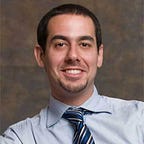A Dedication to Patrick Corder — Community Paramedicine Pioneer (and a Very Kind Human)
In life, control is an illusion. This is a compelling summary of my relationship with the religious tradition in which I was raised — and the fact that I don’t love the idea, doesn’t make it wrong. Embedded within this notion is a tragic truth: few moments, save for marrying your deepest love, are only happy.
The purest joy — like watching your children come into the world — can be spiked with some kind of pain, fear, or at least trepidation. Will the baby breathe alright? (Phew!) Then they get a bit older…which means you’re a bit older…which means time is zooming away and oh gosh, what if I don’t live long enough to see ___? Will they make the right choices? Will I make the right choices? How will I survive the stress of them starting to drive?
My mother likes to say: “Man plans, and God laughs.” (Obviously, not my favorite expression.) But in the depth of my psyche, like a mental tattoo, is the line by Jason Lee in the film Vanilla Sky, a sentence that should be immortal: “You will never know the exquisite pain of the guy who goes home alone. Cause without the bitter, baby, the sweet ain’t as sweet.”
This week, and this year so far (2024), have been huge for Mobile Medicine — Fire, EMS, Community Paramedicine and more. This community of caregivers — selfless and self-sacrificing — is at long last claiming its place at Healthcare’s Table of the Future, and its just deserts as the caregiver (not even “of last resort,” but rather, of only resort) for so much of America’s underserved population — from the city center to the countryside. Since just the start of 2024, Mobile Medicine has found its voice in contexts across the range of health-and-safety conferences and seen its fingerprints on new federal regulations designed to keep Responders safe. It has been featured in books about art and healthcare and garnered new federal innovation funding.
Community Paramedicine, which (I’m simplifying here) maps chronic care management onto emergency medical services, given the high likelihood that the patient will ultimately need an elevated level of care, is becoming an accepted adjunct to traditional home health; an trusted aid to hospice; a release valve to crowded emergency departments; and a path to safe and equitable care that reduces of risk of an adverse encounter (especially for patients suffering from mental challenges and easily misunderstood invisible disabilities). This acceptance is the product of a dozen years of work, but we collectively pay too little mind to the special kind of carnage that can come from caring too much. Although I cannot know the details of why (perhaps no one can), we witness it again: “a work-related post-traumatic stress injury.”
PATRICK CORDER, an innovative and dedicated firefighter-paramedic who recently retired from the City of Alameda Fire Department but passed away this week, should be proud. He pioneered this essential discipline. I had the pleasure of working alongside him as far back as 2014, and vividly recall that he was at times the principal standard-bearer for one of America’s first community paramedicine programs — a program that has grown and matured into the Alameda C.A.R.E. Team (Community Assessment Response and Engagement), with the distinction of being not only collaborative by design (comprising Fire, Police and Family Services), but one of the few fully funded municipal programs of its kind in the United States.
Pat’s death offers evermore unwished-for proof that (again I’ll quote my mother), “Only angels die young.” A smiling and confident persona can mask beneath it…we often know not what. We know that selflessness takes a toll. The Giving Tree only has so many branches, so much trunk.
Both the Jewish Talmud (Sanhedrin 37a) and the Muslim Quran (5:32) say, essentially, “Whoever saves one life has saved the world.” How many lives do our colleagues save — directly, or simply by being there? How often do those who save the world, sometimes hour-by-hour, congratulate themselves for doing so?
They don’t, of course — hubris is anathema to their own humble humanity. It is therefore on the rest of us to watch, marvel, and celebrate them. And to realize that while they appear to be made of Teflon, the buff-and-polished, coiffed-hair carapace is only so strong. Without proper care, it inevitably cracks. When that happens, the crack should hurt the rest of us. We should ask what we could have done differently, what we can and will do different tomorrow, in the name of those we have loved, and admired, and lost.
That loss does not negate the fact that during the too-short life of the best among us, they saved the world time and again. Thus, we owe them tears, photos and eulogies. But most of all, we owe them thanks. Rest well, old friend. You’ve certainly earned it.
